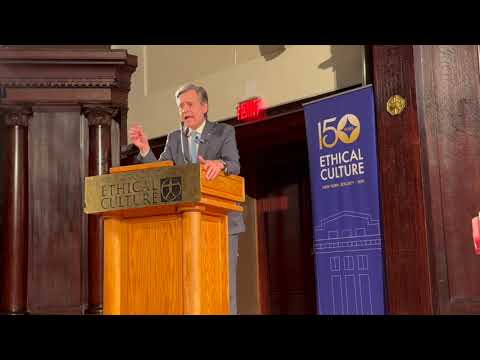
Letter to U.S. Senator Maria Cantwell Requesting that the US Senate Committee on Commerce, Science, and Transportation engage in oversight of the United States Center for SafeSport
September 24, 2021
Dear Chairwoman Cantwell,
In 2018, the United States Center for SafeSport was created to conduct investigations in response to reports of sexual misconduct within the US Olympic and Paralympic teams, as well as to develop national policies and procedures to prevent emotional, physical, and sexual abuse of amatuer athletes. Recent reporting1 and comments made at the September 15th Senate Judiciary Committee hearing raise serious concerns about the ability of SafeSport to fulfill its responsibilities and fully protect athletes. We write to request that the US Senate Committee on Commerce, Science, and Transportation engage in oversight of SafeSport and ensure that the organization has the resources necessary to carry out its critical duties.
This summer, two cases revealed the failure of SafeSport to ensure the safety of athletes it is charged with protecting. Despite serious outstanding allegations of sexual misconduct and an ongoing investigation, Alen Hadzig was allowed to travel to Tokyo as an alternate for the 2021 US Olympic fencing team. Allegations against Mr. Hadzig date back to his time as a student at Columbia University and include numerous reports of sexual misconduct, sexual coercion, sexual harassment, and other violent behaviors by a range of former girlfriends, friends, peers, and current teammates on the US Olympic team. Mr. Hadzig was suspended from campus by Columbia University for a year following a Title IX investigation in 2013.
Following Mr. Hadzig’s selection as an alternate for the Tokyo Olympics, three women filed complaints with SafeSport. Soon after, six Team USA fencers, including two women set to represent the United States at the Olympics, wrote to the Olympic Committee requesting that Mr. Hadzig be removed from the team due to the serious and numerous outstanding allegations of sexual misconduct. SafeSport initially suspended Mr. Hadzig temporarily from participating in international competition due to the ongoing investigation. However, Mr. Hadzig was granted an arbitration hearing at his request and the ban was subsequently overturned. Accordingly, Mr. Hadzig was allowed to travel to Tokyo with a “safety plan” in place. He flew in a different plane, stayed in a separate hotel, and was barred from practicing with female teammates. That USA Fencing deemed these measures were necessary to protect the remainder of the team calls into serious question Safe Sports decision to allow Mr. Hadzig to compete.
Similar failures have been reported in the case of Taylor Crabb2 who faced suspension from the USA Volleyball team in 2017 for misconduct involving a minor. Mr. Crabb, who violated the terms of his suspension, was then issued an extension in 2019 that was intended to last until September of 2021. Instead, the appeal was reduced through arbitration with an end date specifically tailored for him to be able to play in the rescheduled Tokyo Olympics.
These reports are not only disturbing, but illustrate a pattern of shortcomings by SafeSport. In the course of their reporting on Mr. Hadzig’s case, BuzzFeed News learned of a widespread culture of sexual misconduct in fencing and heard from numerous athletes who lacked confidence in SafeSport’s ability to address those issues. Five fencers who had filed complaints with SafeSport reported that the agency failed to interview key witnesses, made basic mistakes about the facts of the case, or took too long to investigate their complaint. One woman who filed a complaint told BuzzFeed: “It really just feels like the organization is being protected from liability.” Another called SafeSport a “joke,” saying that he had “no faith in the organization.”3 These concerns were echoed by Aly Raisman at the Senate Judiciary Committee hearing on the FBI’s handling of allegations against Larry Nassar. Ms. Raisman, an Olympic gymnast, questioned whether the organization could be trusted to do the right thing given its connections to the US Olympic Committee and USA Gymnastics. She further noted that many survivors who report abuse to SafeSport feel like the organization plays “hot potato” with their case, and takes too long to follow up. 4
This manner of operating is falling short of the standard of accountability that we must hold of those who are representing our country, and to the model we are setting for amatuer athletes across the globe. SafeSport was created as an independent body tasked with protecting athletes from abuse and ensuring true accountability. There can be no question that SafeSport is tasked first and foremost with protecting athletes, not upholding the reputation of any national governing body or the US Olympic Committee. To that end, it is vital that athletes trust SafeSport to appropriately respond to allegations of misconduct and carry out impartial and thorough investigations. It is clear that SafeSport is currently falling short of that goal.
We have seen the devastating consequences when our systems fail to protect athletes from abuse and misconduct. SafeSport was created in the wake of hundreds of accusations of sexual abuse against Mr. Nassar in his role with USA Gymnastics. It is imperative that Congress step in to ensure that SafeSport is adequately conducting investigations, taking into account the views of athletes’ respective teams, and not allowing for cherry picked punishments that do not serve as a real means to hold people accountable.

